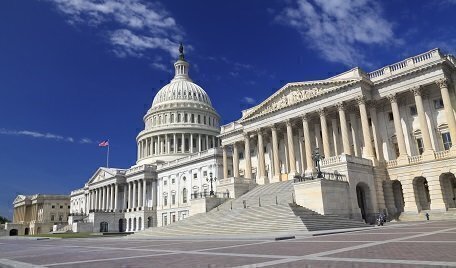The Democratic Party will have a majority in the House of Representatives for the first time since early 2011. How will that affect the constitutional balance in Congress going forward?
 In the Constitution's Article 1, the House and Senate have many responsibilities under the power-sharing relationship between the three branches of the federal government, and the state governments. The most prominent powers of Congress are the ability to pass laws and raise revenues through taxes.
In the Constitution's Article 1, the House and Senate have many responsibilities under the power-sharing relationship between the three branches of the federal government, and the state governments. The most prominent powers of Congress are the ability to pass laws and raise revenues through taxes.
Congress has various other powers, from playing an important role in federal elections to deciding citizenship issues to operating the District of Columbia to proposing constitutional amendments. Many of these powers are listed, or enumerated, in Article I and other parts of the Constitution. Other powers are implied or understood as needed for Congress to conduct business.
But the Constitution also reserves some powers to just the House or just the Senate. For example, only the Senate approves treaties and confirms federal officers, including Supreme Court nominees, in conjunction with the President. It also serves as a trial court if a federal official is impeached for "high crimes and misdemeanors" by the House.
In addition to its impeachment power, which only requires a simple majority to approve articles of impeachment, the House has the job of originating revenue bills. But in reality, the Senate can find ways to start the ball rolling by amending spending bills.
The House also has the important task of electing the President if no candidate wins an Electoral College majority. Also, the Speaker of the House is the next person in line to succeed or replace the President, after the Vice President.
That said, the dynamic of having a Democratic majority in the House and a Republican majority in the Senate brings other factors into play that don't involve powers exclusive to the House. For example, the Democrats would take over the chairs of various committees, including the Appropriations committee critical to the budget process, if they gain control of the House.
Also, Democratic leaders in the House through committee positions can conduct investigations into the conduct of government officials, including the use of subpoenas to get documents, the ability to compel witnesses to testify, and the holding of witnesses in contempt for not testifying or providing information.
But under the Constitution's general operating principles, the House and the Senate need to agree in the majority on any laws that are passed, subject to a presidential veto. And that includes passing budget measures to keep the government in operation. So there will be compromises along the way to the next election in 2020.
In the past 20 years, at least one party in midterm elections has taken control of the House or Senate from the other party. The last time there was configuration like the one heading into 2019, with a Republican President (Donald Trump), a Republican Senate and a Democratic House was during the first six years of Ronald Reagan's administration. Before that, it was the last two years of Herbert Hoover's administration after the 1930 midterm election.
Scott Bomboy is editor in chief of the National Constitution Center.







